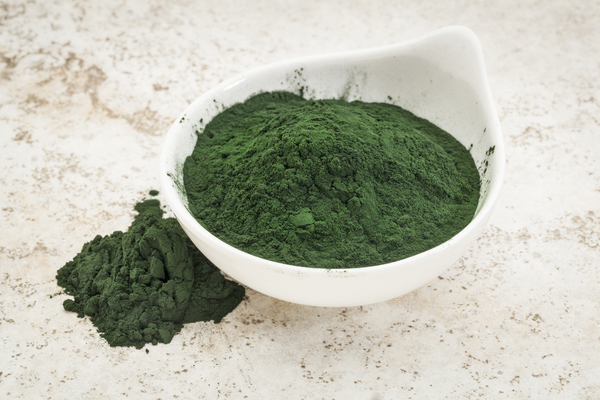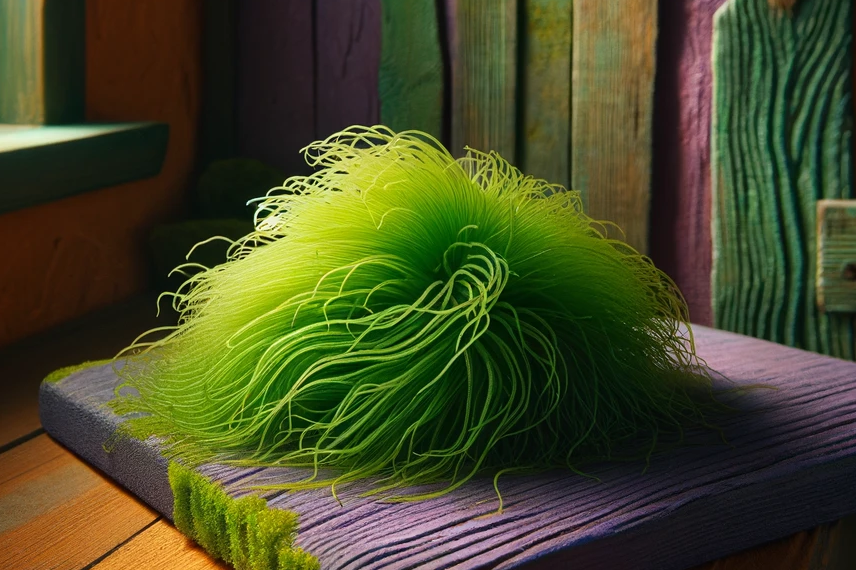Chlorella vulgaris

What is Chlorella vulgaris?
Chlorella vulgaris is a unicellular microalgae that grows in clean water such as rivers, lakes or ponds. It can multiply very quickly and is highly adaptable to different environmental conditions. Chlorella vulgaris has a high content of chlorophyll, the green plant pigment responsible for photosynthesis. Chlorophyll has a similar structure to haemoglobin, which forms red blood cells and transports oxygen. This is why chlorophyll is also known as the "blood of plants".
Chlorella vulgaris is also a very good source of proteins, vitamins, minerals and other vital substances that are important for a dog's health. For example, it contains all the essential amino acids that the body cannot produce itself. It also has a high proportion of B-group vitamins, which are important for metabolism, the nervous system and blood formation. Other vitamins contained in chlorella vulgaris are vitamins A, C, E and K. These have antioxidant, anti-inflammatory and immune-boosting effects. The minerals that chlorella vulgaris provides include calcium, phosphorus, magnesium, iron, zinc and selenium. Among other things, these are important for the health of bones, teeth and muscles as well as for cell division and hormone balance.
How can chlorella vulgaris help your dog?
Chlorella vulgaris has many positive effects on your dog's health. Here are some of them:
- Detoxification: chlorella vulgaris can help your dog eliminate toxins from the body. These include heavy metals such as mercury or lead, chemicals from the environment or drug residues. Chlorella vulgaris binds these toxins in the intestine and promotes their excretion via the stool. Chlorella vulgaris also supports liver function and helps to neutralize free radicals that can cause cell damage.
- Immune system: Chlorella vulgaris strengthens the dog's immune system and helps it to fight off infections. This is due to the many vitamins and minerals contained in Chlorella vulgaris. Chlorella vulgaris also contains so-called beta-glucans, which can stimulate the activity of white blood cells. These are responsible for the defense against pathogens.
- Skin and coat: Chlorella vulgaris improves the health of your dog's skin and coat. This is due to its high chlorophyll content, which has an anti-inflammatory effect and promotes wound healing. Chlorella vulgaris also contains vitamins A and E as well as zinc and selenium, which ensure a healthy skin structure and a shiny coat.
- Odour neutralization: Chlorella vulgaris can neutralize unpleasant odours from the dog's mouth or body. This is due to its high chlorophyll content, which has an odor-binding effect.
If you notice any signs of hypersensitivity or poisoning in your dog, you should see your vet immediately. We are not a substitute for a vet, but we try to be as accurate as possible. Every dog reacts differently and we recommend you get a second opinion or consult your vet if in doubt.
Stay healthy and take good care of your four-legged friend!😊
Similar to Chlorella vulgaris
Spirulina is a blue-green algae that is one of the oldest living organisms on earth. It is found in salty lakes and waters and can feed itself through photosynthesis. Spirulina has a spiral...
Green chip algae, known by the scientific name Aphanizomenon flos-aquae (AFA), is a freshwater algae found primarily in wild, clean, nutrient-rich waters such as Klamath Lake in Oregon, USA. This...
Nori is a seaweed that grows in shallow waters. It is harvested, washed, pressed into thin sheets and dried. Nori has a dark green color and a mild taste. It is rich in protein, fiber, minerals and...
Wakame (Undaria pinnatifida) is a marine brown algae species that was originally native to the coasts of East Asia. However, due to its invasive nature, it has now spread to many other seas. Wakame...



